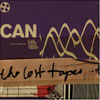Can, "The Lost Tapes 1968-1975"
 All too often these compilations of long-buried, unused material are an inevitable disappointment, consisting of songs that should have stayed hidden or alternate takes that add little to any artists repertoire. However, this is Can, and material from their strongest era, so I came in with higher expectations than I normally would, and these expectations were exceeded. Much of the material on here is as strong as anything that was put on their classic albums of the era and is absolutely essential.
All too often these compilations of long-buried, unused material are an inevitable disappointment, consisting of songs that should have stayed hidden or alternate takes that add little to any artists repertoire. However, this is Can, and material from their strongest era, so I came in with higher expectations than I normally would, and these expectations were exceeded. Much of the material on here is as strong as anything that was put on their classic albums of the era and is absolutely essential.
Anyone with a passing knowledge of Can and how they worked at this time would realize the potential that was here.Rather than going into the studio with traditional "songs," most of Can's earliest albums were just culled and compiled by bassist Holger Czukay from studio improvisations.Essentially, every classic Can album was formed from the same raw material that make up this set.Here, the pieces were collected and edited by keyboardist Irmin Schmidt, as opposed to Czukay, and his son-in-law and collaborator Jono Podmore, and both do a more than respectable job of selecting the best bits.
I was particularly happy that the Malcolm Mooney era of the band gets a fair bit of coverage here.While I am going to jump on that same train as everyone else who has a familiarity with Can and say their masterpiece is Tago Mago, I still think Monster Movie and Soundtracks should get a bit more recognition than they do [hey, my pick remains Ege Bamyasi - Jon].Not many bands can work with two polar opposite vocalists:Damo Suzuki's multi-lingual, often wordless and understated vocals could not be more different than Mooney's off-key, boisterous American voice, but with Can both worked.The Mooney-era tracks on here are mostly great, although "Waiting For The Streetcar" is a bit too heavy on his pathological, mantra-like repetition of precious few lyrics that it becomes an endurance test at over ten minutes.Shorter songs like the dangerously funky "Midnight Sky" and the sinister, disembodied "When Darkness Comes" shine from his contributions.
A few pieces would have fit on Soundtracks as well:the long instrumental "Graublau" pairs the archetypal Can groove with fragments of shortwave radio, adding in an even more notable dissonant element to a band that always pushed the envelope.In terms of pure experimentation, the spectral ambience of "Blind Mirror Surf" and "Evening All Day" are early excursions into the formless sounds that shaped the likes of "Peking O" and "Aumgn" a few years later.Surprisingly, "Oscura Primavera" is a delicate, gentle piece of music from a band that always seemed to have a slightly raw edge to it.
The Damo era is fully represented as well."Bubble Rap," albeit rather skeletal, could have fit on any of the albums from when he was in the band."Dead Pigeon Suite", another soundtrack piece, starts off a bit too close to hobbit-y prog rock with its flutes and carefully plucked strings, but when it reveals itself as an especially vigorous variant on "Vitamin C", all is forgiven.Another suite of different pieces is "Messer, Scissors, Fork and Light", with its taut rhythm and Damo vocals could have been perfect on Ege Bamyasi, though here it is especially noteworthy due to some protracted drum soloing from Liebezeit.Drum solos are usually cheesy, pretentious, and unwarranted, unless your name is Jaki.
A frustrating, but inevitable caveat with a release like this are tracks that are simply too short."Godzilla Fragment," a two minute snippet of a dramatic jam session climax screams to be extended, though according to the liner notes, this was all that appeared on the tape.The chunk of "On The Way To Mother Sky," a piece that obviously evolved "Mother Sky" also feels too short overall.
In a recent interview about this set, Schmidt has claimed that this will be the extent of the archival releases, with the possible exception of additional live recordings being issued.Based upon the performances included, that alone is an attractive proposition.In their manner of using studio material as a jumping off point, the originally three-minute "Spoon" gets an extended 17 minute workout, in a similar vein to the version on the 40th anniversary issue of Tago Mago from last year.Live takes of "Mushroom" and "One More Saturday Night" also vaguely recall their "proper" forms and take off in their entirely own unique direction.A number of tracks, "Abra Cada Braxas," "A Swan is Born," and "Networks Of Foam," especially, are also live improvisations without any studio reference point.Listening to this set for the first time without the liner notes handy, I did not even realize this until the polite applause at the end.
It should be noted, however, that the title of this set is a bit misleading, because there are two tracks that slip in from the band’s maligned later period."E.F.S. 108" (another installment of their Ethnological Forgery Series) and "Barnacles" date from 1976 and 1977, respectively.The latter, featuring Czukay replacement Rosko Gee on bass, actually makes for a decent, though comparatively one dimensional take on the disco era that is a bit flat in the context of the set, but by no means a bad track.
If this is truly it for the Can archives, then it is a bittersweet release, since what is here is so brilliant that I greedily want to hear more [hey, what about all those singles version and B-sides? - Jon], but I would much rather hear Can end on this high note instead of a two disc compilation of Karoli tuning his guitar eventually making its way onto the market.Although, I would still love to see that legendary 12 hour session of "You Doo Right" that was paired down to the 20 minute album version see the light of day, especially given that today’s DVD-A/BluRay/FLAC technology could present it in its full, uninterrupted form.However, a large part of me thinks it is probably best to stay in its unreleased, legendary status…much like the bootlegged six hour workprint of Coppola's Apocalypse Now, the actuality may taint the legend.If nothing else, we should have some unheard live material ahead of us.
But for the here and now, The Lost Tapes is an absolutely essential document to anyone with even a passing interest in Can.While there are a few weak moments, the bulk of what makes up these three discs could pass for any of their best studio albums easily.Coupled with the detailed liner notes, track-by-track commentary by Schmidt, and deluxe packaging, this one is a no-brainer, and I highly doubt any such collection of archival material from any other artist will come close to this zenith of a release.
samples:
 




